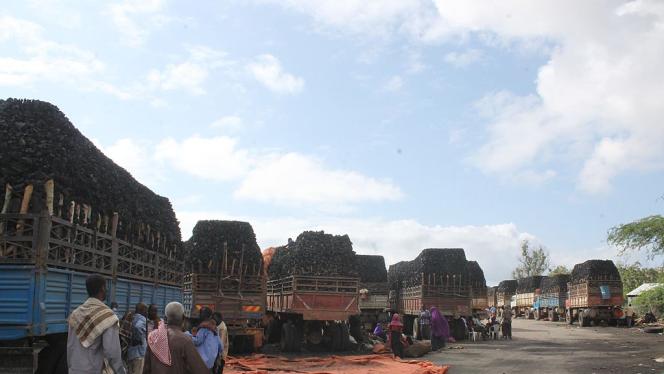Tuesday 29 October 2024
Behind Somalia’s faltering campaign against charcoal

Somalia’s failure to outlaw the charcoal trade and provide alternatives for citizens’ energy needs risks turning the country into a man-made desert
In January 2012, then prime minister of Somalia, Abdiweli Gaas, wrote a letter to the UN security council calling on member states to support Somalia’s efforts to outlaw charcoal production. “The Transitional Federal Government implemented this measure because charcoal production not only destroys the environment and contributes to food insecurity, but also funds the deadly campaign being carried out by al-Shabaab,” the letter said.
The domestic ban came into effect in December 2010 during the tenure of President Sharif Sheikh Ahmed as part of an effort to stop deforestation and cut off a critical supply of cash to militia groups fighting the government. Sharif’s environment minister at the time, Burʽi Mohamed Hamza, outlining the stakes, told Reuters that “radical groups” worked with “corrupt businessmen” to export charcoal and “perpetuate the killing of civilians.” “We cannot wait for security to come while ignoring this disaster,” Hamza warned. Gaas also quoted a speech by then UN secretary-general Ban Ki-moon who also directly linked illicit charcoal sales out of Somalia to the on-going conflict in the country’s south. “Others make millions of dollars from destroying forests for charcoal to sell abroad,” he said, adding, “these people will resist our efforts to bring stability and the rule of law to Somalia.”
Somalia’s path to clamping down on this trade has been long and vexatious. Despite the ban, between 2011 and 2017, the UN estimates that 8.2 million trees were cut down. The logs are primarily acacia wood which is widespread across Somalia. Whilst industry provides opportunities for militia groups to make cash and contributes to environmental destruction, it also provides a crucial lifeline to loggers and people who transport wood. In 2022, when fuel costs shot up for example after Russia invaded Ukraine, it provided an affordable alternative for people priced out of other energy sources. Unsuccessful attempts to enforce a ban despite these factors have drawn in the international community.
In 2012, the UN security council imposed the ban through resolution 2036, noting that charcoal exports contribute funds for al-Shabaab – a global terrorist organisation - and worsened the humanitarian situation in the country. Future resolutions would reinforce this decision. Resolution 2444 adopted in 2018 reaffirmed the ban on the import and export of Somali charcoal and condemned the ongoing charcoal exports in violation of the earlier resolution. More than 80% of that charcoal is exported to Gulf countries, according to a report by the Global Initiative Against Transnational Organized Crime (GI-TOC). According to a report by Correctiv, a German non-profit investigative journalism platform, the trade is worth $15 million. Ken Menkaus, a political scientist and expert on Somalia, put the figure closer to $40-70 million out of Kismayo alone.
After al-Shabaab lost control of territory (and Kismayo port) to local militias and government forces it also banned the trade, ostensibly on environmental grounds even though it was once one of its main sources of revenue. “The group’s reasoning behind this abrupt shift in policy was apparently that it had more to gain from disrupting Jubaland’s export revenues than by taxing charcoal shipments as they travelled from inland production sites to Kismayo port,” GI-TOC reported.
By 2023 a report to the UN security council compiled by a panel of experts said they had not “recorded any illicit export of charcoal from Somalia since January 2022.” The panel warned however that large charcoal stockpiles were leftover and suggested a one-time exemption to allow the controlled disposal of these stockpiles under specific restrictions.
In addition to the UN, the EU has also imposed its own measures banning the export and import of Somalia charcoal and so has the US, by imposing targeted sanctions on numerous individuals involved in the charcoal business.
These multilateral efforts were designed to protect Somalia’s fragile environment and were reinforced by a series of policies and laws implemented by the Somali government. Notably, the recent passage and ratification of the Environmental Management Bill in February this year. This legislation explicitly prohibits all forms of environmental degradation and aims to protect Somalia's natural resources.
However, recently, an uproar on social media has brought renewed attention to the unprecedented deforestation across the country, prompting the environment ministry to release a statement. The ministry noted that it held a meeting with various government officials, including representatives from the interior ministry, estate leadership, and the police chief. In the statement, they expressed a commitment to collaborate in the fight against deforestation.
Such promises often remain mere rhetoric, as evidenced by the numerous similar statements previously issued by the government that have resulted in little tangible action.
It’s not strange to see Somali political leaders on global stages demanding global solidarity and support for the country’s fight against the twin challenges of environmental degradation and climate crisis. Yet, unfortunately, successive administrations have failed to adequately address the unprecedented environmental challenges facing the nation. Despite these calls for action against environmental degradation, tangible progress within the country has remained largely unattainable. Somali political leaders frequently kickstart ambitious environmental projects and programs in elaborate ceremonies, heavily broadcasted for public attention, only to abandon them within a matter of weeks.
The failure isn’t confined to the federal level; it’s also evident within the federal member states who, in comparison with the FGS, have greater control over their jurisdictions. For instance, the semi-autonomous Puntland state has attempted to ban charcoal production on numerous occasions, yet these efforts have failed to materialise. Similarly, in the self-declared independent state of Somaliland, the ban on charcoal production has proven to be a complete debacle.
Despite calls for action from the international community, and the establishment of local laws, the charcoal industry continues to thrive unchecked. This raises a critical question that demands an immediate response: Where is the enforcement of these regulations? Why does the charcoal industry continue to operate in defiance of established laws and international pressure?
One significant factor is the apparent lack of political will within the government and local authorities to enforce the Environmental Management Bill and other related regulations. Despite having the legal framework in place, there appears to be insufficient commitment to implementing and upholding these laws effectively.
The pervasive security challenges and poverty in Somalia further complicate the enforcement of environmental laws and regulations. One logger told the Guardian that despite the fact that al-Shabaab has ordered a stop on cutting dry trees, he has no alternative income source. “It’s our only way to make money”, he said. The consequences feed into a cycle which destroys livelihoods for herders and batters’ soil, creates further displacement and poverty and then forces more people into these illicit trades.
Abdullahi Emi Mohamed, an environmental expert said “all these connections can be explained — that the people have cut down the large number of trees that could have sustained the life of the rural people and their animals.”
Another critical factor is the involvement of powerful business individuals and politicians in the charcoal industry. These influential figures often have vested interests in the continuation of the charcoal trade, which leads to corruption and the deliberate undermining of laws designed to curb environmental degradation. Their involvement creates obstacles to reform, as they leverage their power and influence to avoid accountability and protect their economic interests.
It’s noteworthy to mention the poverty aspect of the charcoal industry. In many rural and urban areas, most households rely on charcoal as their primary fuel for cooking, primarily because they lack access to more sustainable and affordable alternatives such as electricity or gas. This dependence is particularly common among low-income families, who often have no other viable options. As a result, the demand for charcoal has surged, leading to an increase in local production.
Somalia cannot put an end to the illegal charcoal trade and environmental degradation without international support. The international community, particularly Somalia’s allies, can play a role by implementing further targeted sanctions against business oligarchs, politicians, and entities involved in the charcoal business. Financial and travel restrictions on those benefiting from these illegal activities would increase pressure and serve as a strong deterrent. Unfortunately, Somalis have reached a point where threats of sanctions from the international community are the only language Somali leaders seem to understand. After all, Somalis have become an Ouroboros, the mythical serpent that devours its own tail.
The Somali government must also step up its game in solving this issue. Rhetorical statements and laws that largely remain ineffective are not the solution. There must be political willingness. Allocating adequate resources to regulatory bodies and enhancing the capabilities of law enforcement agencies should be the first steps. Ensuring that officials tasked with implementing these laws are well-trained and supported is also essential. Moreover, encouraging greater transparency and accountability within the government will help combat corruption and ensure that environmental regulations are rigorously enforced.
One crucial but often overlooked part of the charcoal elimination discourse is the necessity of finding viable alternatives for local communities whose livelihoods depend on charcoal production. These communities, often from low- and middle-income families, have limited access to other means of income or energy sources. Without offering them alternatives, policies aimed at ending charcoal production are likely to face resistance and, unfortunately, are likely doomed to fail.
International partners’ support is key here, considering the Somali government’s limited institutional capacity. An effective strategy already initiated by the ministry of environment of climate change (MoECC) is the distribution of liquefied petroleum gas (LPG) as a cleaner and more sustainable energy source. However, the current scale and pace of this initiative are insufficient. To make an impact, the distribution of LPG must be significantly accelerated and expanded. By providing widespread access to LPG, the Somali government, and by extension, federal member states, can dramatically reduce the amount of wood needed for cooking, which is a primary driver of deforestation.
Furthermore, existing environmental laws must be implemented rigorously and consistently. This entails enforcing, without fear or favour, penalties against violators and also conducting regular inspections and monitoring to ensure compliance. The government should establish clear enforcement protocols and create mechanisms for reporting and addressing violations. Strengthening the judicial system to handle environmental cases effectively and swiftly is also crucial.
Somalis have historically cherished a deep connection to their land and nature, beautifully reflected in their poetry, songs, metaphors and folktales. In the traditional sense, living with nature has symbolised wealth, status and dignity. However, this reverence now faces an existential threat. Once-celebrated lush green lands, immortalised in traditional poems and Somali artistic expressions, are rapidly disappearing. The dense canopies that inspired poets and provided shelter to wildlife are being replaced by barren land. Ancient groves, once revered as sacred guardians, are now reduced to stumps and ashes, casualties of relentless deforestation. Zainab Hassan, a poet and writer, mourns the tragic loss of trees with an outpouring of anguish in her poem Ruin:
For the forest and indigenous trees, I weep.
The Cadaad, the Caday
The Damal, the Dhamas
The Garas, the Galool
The Qurac, the Qansax
The Xarar, the Xamar
The Yaaq, the Yicib, I weep.
I weep For the mango trees, I weep.
Thirty years it took for you to grow
In a matter of minutes you disappeared.
All cut down for charcoal.
I weep for the forest
Earth’s lungs hewed.
Today, the vast majority of trees, which have long stood as symbols of culture, heritage, and have supported our livelihoods, have become victims of monetised desertification. This risks condemning Somalia to becoming a sordid example of a man-made desert in the twenty-first century—an outcome that should compel – Somali leaders and citizens alike - to take action.










